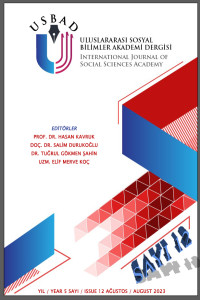Abstract
Bu araştırmanın amacı, ortaokul öğrenci velilerinin dijital ebeveynliğe yönelik görüşlerinin belirlenmesidir. Araştırmada nitel araştırma yöntemlerinden olgubilim deseni kullanılmıştır. Kolay ulaşılabilir durum örneklemesi ile belirlenen araştırmanın çalışma grubunda çocukları Elazığ merkezde ilköğretim ikinci kademede öğrenim gören 20 ebeveyn yer almaktadır. Araştırmanın verileri araştırmacılar tarafında geliştirilen ve 10 sorudan oluşan yarı yapılandırılmış bir görüşme formu ile toplanmıştır. Ebeveynleri ile yapılan görüşmelerden elde edilen veriler içerik analizi yöntemine göre çözümlenmiştir. Araştırma sonucunda velilerin dijital ebeveynliğe görüşlerine yönelik 7 tema ortaya çıkmıştır. Bu temalar: ‘Dijital teknolojilerin kullanım amaçları ve sıklıkları’, ‘Çocuklar ve video izleme uygulamaları, ‘Çocuklar ve dijital oyunlar’, ‘Çocuklar ve online alışveriş’, ‘Çocuklar ve sosyal medya uygulamaları’, ‘Dijital teknolojilerin eğitsel kullanımı’ ve ‘Çocuklar ve dijital teknolojilerin güvenli kullanımı’ şeklindedir.
References
- Büyüköztürk, Ş., Kılıç Çakmak, E., Akgün, O. A., Karadeniz, Ş. & Demirel, F. (2012). Bilimsel araştırma yöntemleri (12. Baskı). Ankara: Pegem Yayıncılık.
- Ersoy, A. F. (2016). Fenomenoloji. Ahmet Saban ve Ali Ersoy (Eds), Eğitimde Nitel Araştırma Desenleri içinde (s.51-105). Anı Yayıncılık.
- Gliner, J. A., Morgan, G. A., & Leech, N. L. (2015). Uygulamada Araştırma Yöntemleri: Desen ve Analizi Bütünleştiren Yaklaşım. (Çev.). Selahattin Turan. Ankara: Nobel Yayıncılık (Orijinal eserin yayın tarihi, 2009).
- Huang, G., Li, X., Chen, W., & Straubhaar, J. D. (2018). Fall-Behind Parents? The Influential Factors on Digital Parenting Self-Efficacy in Disadvantaged Communities. American Behavioral Scientist 62(9), 1186-1206.
- İnan-Kaya, G., Mutlu-Bayraktar, D., & Yılmaz, Ö. (2018). Digital Parenting: Perceptions on Digital Risks. Kalem Eğitim ve İnsan Bilimleri Dergisi 8(1), 131-157.
- Konok, V., Bunford, N., & Mikloosi, A. (2020) Associations between Child Mobile Use and Digital Parenting Style in Hungarian families. Journal of Children and Media 14(1), 91-109.
- Merriam, S. B. (2015). Nitel Araştırma: Desen ve Uygulama İçin Bir Rehber. (Çev.). Selahattin Turan. Ankara: Nobel Yayıncılık.
- Modecki, K. L., Goldberg, R. E., Wisniewski, P., & Orben, A. (2022). What Is Digital Parenting? A Systematic Review of Past Measurement and Blueprint for the Future. Perspectives on Psychological Science 17(6), 1673–1691.
- Rode, J. A. (2009). Digital Parenting: Designing Children’s Safety. People and Computers XXIII Celebrating People and Technology (HCI), 1 - 5 September 2009.
- Sönmez, V. & Alacapınar, F. G. (2014). Örneklendirilmiş Bilimsel Araştırma Yöntemleri (Genişletilmiş 3. baskı). Ankara: Anı Yayıncılık.
- Yıldırım, A., & Şimşek, H. (2013). Sosyal Bilimlerde Nitel Araştırma Yöntemleri. (Genişletilmiş 9. Baskı). Ankara: Seçkin Yayınevi.
- Yusuf, M., Witro, D., Diana, R., Santosa, T. A., Alfikri, A., & A., Jalwis. (2020). Digital Parenting to Children Using The Internet. Pedagogik Journal of Islamic Elementary School 3(1), 1–14.
Abstract
The purpose of this research is to determine the views of secondary school students' parents on digital parenting. Phenomenology design, one of the qualitative research methods, was used in the research. The study group of the study, which was determined by the easily accessible situation sampling, included 20 parents whose children were studying at the second level of primary education in the center of Elazig. The data of the study were collected with a semi-structured interview form consisting of 10 questions developed by the researchers. The data obtained from the interviews with their parents were analyzed according to the content analysis method. As a result of the research, 7 themes emerged regarding parents' views on digital parenting. These themes are: 'Aims and frequency of use of digital technologies', 'Children and video watching applications', 'Children and digital games', 'Children and online shopping', 'Children and social media applications', 'Educational use of digital technologies' and 'Children and safe use of digital
technologies'.
References
- Büyüköztürk, Ş., Kılıç Çakmak, E., Akgün, O. A., Karadeniz, Ş. & Demirel, F. (2012). Bilimsel araştırma yöntemleri (12. Baskı). Ankara: Pegem Yayıncılık.
- Ersoy, A. F. (2016). Fenomenoloji. Ahmet Saban ve Ali Ersoy (Eds), Eğitimde Nitel Araştırma Desenleri içinde (s.51-105). Anı Yayıncılık.
- Gliner, J. A., Morgan, G. A., & Leech, N. L. (2015). Uygulamada Araştırma Yöntemleri: Desen ve Analizi Bütünleştiren Yaklaşım. (Çev.). Selahattin Turan. Ankara: Nobel Yayıncılık (Orijinal eserin yayın tarihi, 2009).
- Huang, G., Li, X., Chen, W., & Straubhaar, J. D. (2018). Fall-Behind Parents? The Influential Factors on Digital Parenting Self-Efficacy in Disadvantaged Communities. American Behavioral Scientist 62(9), 1186-1206.
- İnan-Kaya, G., Mutlu-Bayraktar, D., & Yılmaz, Ö. (2018). Digital Parenting: Perceptions on Digital Risks. Kalem Eğitim ve İnsan Bilimleri Dergisi 8(1), 131-157.
- Konok, V., Bunford, N., & Mikloosi, A. (2020) Associations between Child Mobile Use and Digital Parenting Style in Hungarian families. Journal of Children and Media 14(1), 91-109.
- Merriam, S. B. (2015). Nitel Araştırma: Desen ve Uygulama İçin Bir Rehber. (Çev.). Selahattin Turan. Ankara: Nobel Yayıncılık.
- Modecki, K. L., Goldberg, R. E., Wisniewski, P., & Orben, A. (2022). What Is Digital Parenting? A Systematic Review of Past Measurement and Blueprint for the Future. Perspectives on Psychological Science 17(6), 1673–1691.
- Rode, J. A. (2009). Digital Parenting: Designing Children’s Safety. People and Computers XXIII Celebrating People and Technology (HCI), 1 - 5 September 2009.
- Sönmez, V. & Alacapınar, F. G. (2014). Örneklendirilmiş Bilimsel Araştırma Yöntemleri (Genişletilmiş 3. baskı). Ankara: Anı Yayıncılık.
- Yıldırım, A., & Şimşek, H. (2013). Sosyal Bilimlerde Nitel Araştırma Yöntemleri. (Genişletilmiş 9. Baskı). Ankara: Seçkin Yayınevi.
- Yusuf, M., Witro, D., Diana, R., Santosa, T. A., Alfikri, A., & A., Jalwis. (2020). Digital Parenting to Children Using The Internet. Pedagogik Journal of Islamic Elementary School 3(1), 1–14.
Details
| Primary Language | Turkish |
|---|---|
| Subjects | Turkish Education |
| Journal Section | Research Articles |
| Authors | |
| Early Pub Date | September 2, 2023 |
| Publication Date | August 29, 2023 |
| Acceptance Date | August 29, 2023 |
| Published in Issue | Year 2023 Issue: 12 |


